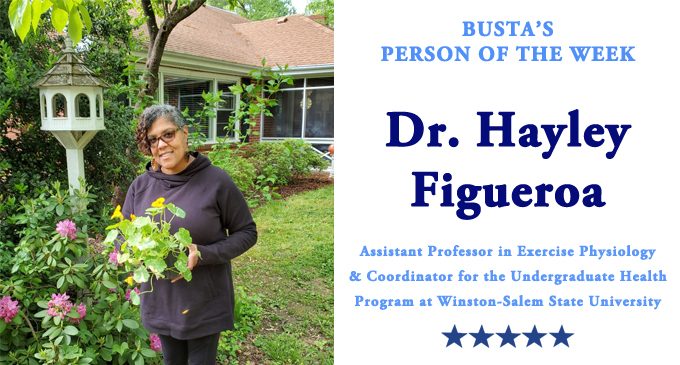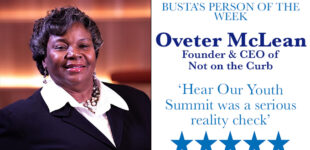Busta’s Person of the Week: Dr. Hayley Figueroa: ‘If you’re always ready, you never have to get ready.’

By Busta Brown
Dr. Hayley Figueroa is a first generation American from New York City. Hayley’s parents are from the Caribbean. “In the Caribbean, you always have stuff growing. When I was a child, my father took our one-third of an acre and used one third of that as his garden. It was huge. He was out there morning until night planting things and dealing with the soil, or what have you,” she said.
Dr. Hayley Figueroa was a daddy’s girl, so she was always by his side, learning one of the most important skills to humankind: gardening. She was always drawn to growing, so as an adult it was a natural transition. “Now that my father is gone, this is a way to stay connected,” said Dr. Figueroa.
She shared some of the benefits to having your own garden, versus going to the grocery store to buy fruits and vegetables. “The farmer’s market is a great alternative if you don’t have a garden, but for me, the greatest benefit to having a garden is it’s right outside my door. I don’t have to leave the house. I can go outside, pick things, and make a healthy meal out of them. I made a salad the other day,” said Dr. Figueroa with a joyful smile. She said the second benefit to having your own garden is saving lots of money. “Buying produce at the grocery store can be very expensive. And when you grow it yourself, you know what’s in it. No pesticides and no chemical laden fertilizers. My garden is organic because I only put into it what’s organic. I never put chemicals in my garden, so my food is safe. They’re no recalls in my garden,” she jokes.
Dr. Figueroa is an assistant professor in Exercise Physiology, coordinator for the undergrad Public Health Program at Winston-Salem University. During her personal time, she’s a grower. And during this COVID-19 pandemic, having your own garden is vital. Dr. Figueroa shared another extremely important benefit to having your own garden: “There’s something called food sovereignty, which is having control over your food access and what you eat. So more than anything else, you’ll have control over what your family eats. And it’s not dependent on price or whether your car has gas. Your food is always available whenever you need it. So having that control over your food, particularly in the communities of color and impoverished communities, is invaluable. You don’t have to wait on your food stamps to come, or depend on getting a ride to the grocery store, because your food is right there.”
As I was listening to Dr. Figueroa, I thought about a conversation I saw on YouTube between James Baldwin and Nikki Giovanni. Baldwin mentioned that we know some type of destruction is coming, so we must be prepared. And what immediately came to my mind was gardening. I shared that with Dr. Figueroa and her response was spot on. “I was in New York during 9/11, so I’ve been through some stuff and I’ve seen some stuff. So I’ve learned if you stay ready, you don’t have to get ready. And that’s probably the way we should always think. We’ve seen earthquakes and hurricanes in cities that don’t normally have those kinds of natural disasters. You can’t predict when disaster is coming, so we must be prepared with what we need. Where else will you get it from, if you don’t have it on site?”
The more I listened to Dr. Figueroa, the more empowered I felt about taking control over my family’s food access and what we eat. Unemployment is sky high, but the good news is gardening is very affordable. “A seed packet at the dollar store is anywhere between 10 to 25 cents. In most seed packets, you have between 30 to 1,000 seeds. You’re paying less than a penny for a plant. If you got two tomatoes from your plant, that plant paid for itself. A packet of lettuce seeds has between 250 and 500 seeds in it. So that’s 250 plants. And you only spent 10 cents. And you can grow lettuces and herbs on a window sill, so you don’t need a yard,” said Dr. Figueroa.
How do we begin? “Jump right in! Get yourself some red party cups from the dollar store, some potting soil, some plants, some seeds, and begin growing. I can’t tell you how miraculous it is to see your first seeds sprout.”
What kind of tools do we need? Before she answered my question, she started laughing. “I’m going to tell you the real tools and then the struggle tools. The real tools are a garden trowel, a cultivator, and some gloves. That’s really all you need to start. And you can get all of that at the dollar store.”
I was waiting to hear what were the struggle tools, because I’m on a serious budget. And North Carolina is under a stay-at-home order, so I was hoping the struggle tools were things we can find around the house. I was correct. Everything we need is right there in our kitchen. “A sturdy serving spoon can serve as a trowel, cuz you can dig with it. And a serving fork can serve as a cultivator, because you need something to scratch up the dirt. You can plant in a clear shoebox. As long as you can put holes in it, it can be a planter. My favorite tool last year was a plastic take-out fork. I used it for a whole season because it’s great to make holes to put your seeds in.”
She also shared information on the most effective ways to grow. “Leafy plants can get by with four hours of direct sunlight. Things like tomatoes need about six to eight hours of sunlight. Fruit trees need eight hours of sunlight. The best time to plant a fruit tree is in the fall. Plant things where they will thrive. Collard greens need a little bit of shade, so make sure you follow the instructions on the back of your seed packet, because it’s going to tell you what the plant needs. If you don’t give it what it needs, it won’t give you what you want. The best way to find out what grows best in your area is to check out your agricultural extension office.”
Garden centers are considered an essential business, so you can get started today. Begin saving tons of money by having a garden right outside your door. You and your family can eat free and healthy daily.
To contact Dr. Hayley Figueroa, visit The Urban Academic on Facebook and Instagram.














